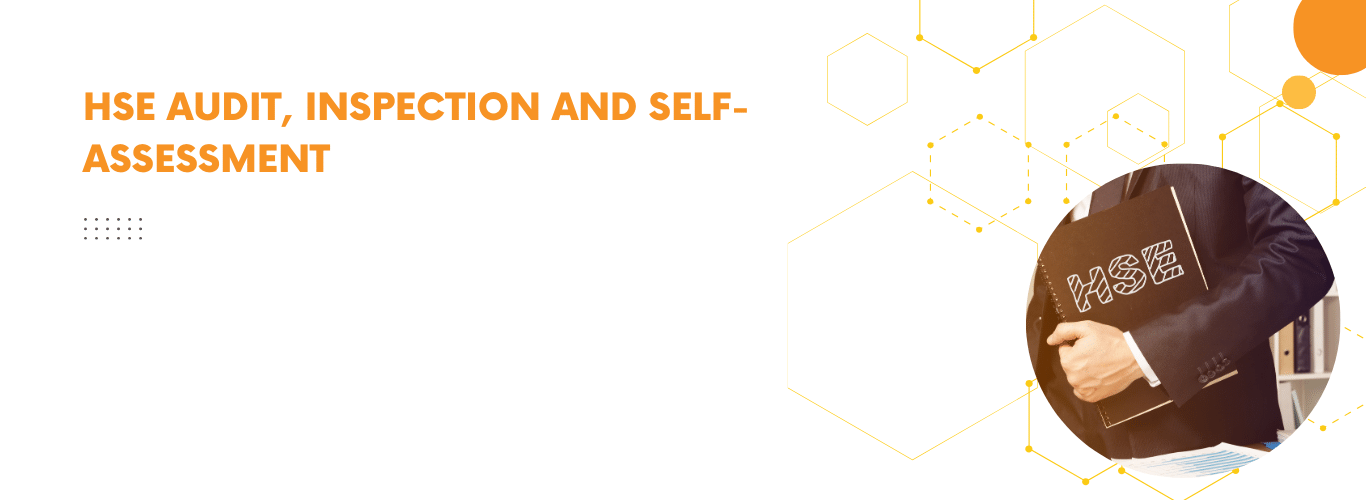
Course Objectives:
After completing the training, the employee will:
- Understand the importance of comprehensive, planned, and periodic audits, inspections, and self-assessments in providing accurate and objective feedback to management.
- Have practiced how to evaluate the progress of achieving HSSE targets, maintaining regulatory compliance, and effectively utilizing the HSSE systems and procedures
- Have practiced how to determine that all elements of the HSSE systems and processes have been developed and documented in accordance with applicable regulatory requirements and commitments
- Understand and have practiced how to verify that the HSSE systems and processes are adequate to achieve their purpose, have been implemented, and are effective;
- Have practiced how to verify that corrective and preventative actions have been implemented for identified deficiencies.
- Understand what are the definitions of: HSSE Comprehensive Audit, Behavior Audit, System Audit, HSSE Inspection, Site Verification Visits (SVV), SOC, Self-assessment, Security Audit
Who should attend?
- HSSE Personal & organization internal auditors
Training Methodology:
- Participants will learn by active participation during the program using exercises, questionnaire, syndicate and group discussion.
Course Outlines:
- Why & How Manage Health & Safety?
- What is Health and Safety?
- Why Manage Health & Safety?
- Consequences of Not Managing Health and Safety
- Reasons to Manage Health and Safety
- How can occupational safety and health be managed?
- PDCA Cycle Plan – Do – Check – Act
- Overview of ISO 9001: 2018, ISO 45001:2018 & ISO 14001: 2015 Management Systems
- What is Annex SL?
- Implementing ISO 45001:2018
- Auditing & Inspection Process?
- Safety Audit
- Key Definitions
- What is HSSE Audit?
- HSSE audits objectives:
- Objectives & benefits of Audit Process
- Audit Classification
- Types of Safety Management Audits
- Internal Audit
- External Audit
- 7 Principles of Auditing
- Safety Audit Protocol
- Establishing an Audit Program
- Audit Process
- Guidelines for Auditing a Management System
- Five Important Steps to a Workplace Safety Audit
- Planning
- Audit Scope
- What is the Auditor looking for?
- How do Safety Audit?
- Audit Monitored Activities
- Safety Statistics
- Procedures – availability and adherence
- Training Procedures
- Safety Systems
- Emergency Procedures
- Health and Safety Facilities
- Health monitoring policy
- Health monitoring policy
- Some general comments
- Especially Vulnerable Situations
- Continual Improvement
- Safety Inspection
- Differences Between Auditing & Inspection Process?
- Audits Verse Inspections
- HSSE Audit and Inspection
- Who conducts the Safety Audit?
- The Audit Team
- Typical Audit Team
- Who serves on the Safety Audit Team
- Safety Audit Team:
- Auditor Code of Ethics
- Conducting the Audit
- Opening Meeting
- Collecting Audit Evidence
- Specific Evidence to Look For
- Conducting Interviews
- How to Interview
- Typical Questions of any Employee
- Typical Questions of Critical Operations
- Categories of Interviewees:
- What happens during a Safety Audit?
- Safety Audit Preparation
- Fact Finding
- Examining Documents and Records
- Documents and Records
- What to Look for in Documentation
- Documentation Hierarchy
- Audit Findings
- Non-Conformance vs. Non-Compliance
- Types of HSSE Nonconformance
- What to do about a nonconformance
- Closing Meeting
- Potential Topics for Closing Meeting
- Review of Findings of the safety audit
- Recommendations from the safety audit
- Corrective Actions from the safety audit
- Publish the Safety Audit results
- What are the outcomes of a Safety Audit
- Audit Completion
- HSE Audit Report
- Monitoring and Follow-up:
- Preparation of Audit Report
- Content
- Possible Contents of Audit Report
- Document Retention
- Role of HSSE Auditors in Corrective Action
- Role of Senior Management
- Specific Expectations of Management
- Proposed Characteristics of Safety Audits, Safety Inspections and Safety Walks
- Auditing Skills
- What is an Auditor?
- Auditor Attributes Discussion
- Auditor Qualification Criteria
- Professional Skills
- People Skills
- Personal Attributes
- Maintaining Auditor Skills
- Auditor Code of Ethics
